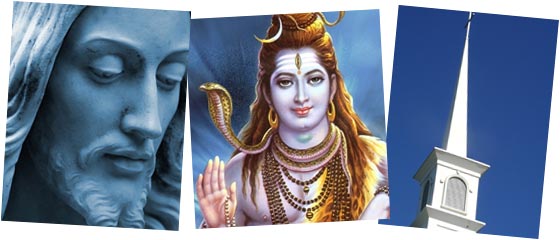 ![[Header]](../XuShared2/Line3.jpeg)

Add a Comment (Go Up to OJB's Blog Page) How Great Thou ArtEntry 1363, on 2012-02-24 at 13:51:50 (Rating 4, Religion) I don't like using other people's misfortune to make political, theological, or philosophical points, especially when those points could be construed as being cynical and negative. But I have to, I really do.
How often do I see, on TV news and other sources, pictures of people thanking God for nothing in particular after a major disaster. It's bizarre really, to see people praying and singing about how great and merciful their god is after a fatal disaster. I guess they could be thankful that they survived but what about the unnecessary suffering and deaths of others?
The most recent example was at the commemoration of the Christchurch earthquake where a large group of people sung the hymn "How Great Thou Art". Really? They think their god is great after allowing their city to be devastated and their fellow citizens to be killed by a series of earthquakes?
Before I go any further I do have to say that many hymns, including this one, can sound quite inspiring when performed well. Many (like this one) are derived from folk tunes though, so their musical merit is independent of their religious context. Also, it's the mindless acceptance of the message of the hymn which I find annoying.
But getting back to the ultimate interpretation of the hymn and of other acts of praise to God. What are these really saying?
Some people might say that natural disasters are, as the name suggests, natural and independent of God's will. But if this God is so great could he not control natural disasters? How hard could it possibly be for an entity who allegedly created the whole universe? (according to the hymn: "O mighty God, when I behold the wonder. Of nature’s beauty, wrought by words of thine") Surely stopping an earthquake should be trivial.
So if God couldn't stop the earthquakes he's clearly not great but what if he could stop them but chose not to? Ponder these words from the hymn: "And how thou leadest all from realms up yonder, Sustaining earthly life with love benign". Love benign? Really?
In some ways choosing not to help is much worse. In that case he may be great in some sense but probably not good. If someone is evil can they still be great? I'm sure a "great but evil" god isn't really what the hymn is suggesting!
And the alleged sins of humans (just exactly what are they, and are they really that bad?) have always been used as a convenient excuse for God's seeming inability to do the right thing. The hymn says: "When crushed by guilt of sin before thee kneeling, I plead for mercy and for grace and peace," Yeah, good luck with that.
If God was punishing sinners then he chose an odd way to do it. The city he allowed to be decimated was named "Christchurch". Could there be any other place name with a better connection to our dominant religion? And the city's magnificent cathedral and several churches were destroyed but the Muslim mosque was left intact. Plus I didn't hear of any places of lesser religious standing (betting establishments, pubs, brothels) being unusually badly affected. I guess God really does have a wacky sense of humour.
But then there's the old cop out that believers sometimes use when they say that God has some higher purpose which we don't understand, and if we could understand it we would see that the disasters he has caused, or allowed to happen, are actually an essential part of the big picture.
But as the popular advertising campaign says "yeah, right!" Does anyone really believe that? Would anyone believe it if it was an excuse used by a political leader? That's a good question actually because maybe the answer is "yes".
There are parallels with some political actions which promise long term gains through short term pain. The great libertarian revolution in New Zealand would be a classic example. The problem is that the long term gain never happens (at least not for the vast majority). Maybe the politicians and God are both guilty of deception.
I guess there is always hope, even though its based on a fantasy (the hymn again: "When burdens press, and seem beyond endurance, Bowed down with grief, to Him I lift my face; And then in love He brings me sweet assurance") But I guess as one earthquake followed another the people of Christchurch were wondering when exactly this "sweet assurance" would arrive.
I think God has been let off away too easily. He needs to be held to account, just like we should hold our politicians to account. Forget the songs of praise. Maybe the New Zealand rock band, Head Like a Hole, have some more appropriate lyrics: "Glory Glory Hallelujah, just like a knife, it cut's right through ya. Glory Glory Hallelujah, just like a lie, I see right through ya."
 There are no comments for this entry. 
You can leave comments about this entry using this form. To add a comment: enter a name and email (both optional), type the number shown above, enter a comment, then click Add.
Note that you can leave the name blank if you want to remain anonymous.
Enter your email address to receive notifications of replies and updates to this entry.
The comment should appear immediately because the authorisation system is currently inactive.
![[Comments]](../XuShared/Comment1B.jpeg) ![[Preview]](../XuShared/Comment6B.jpeg) ![[Blog]](../XuShared/Up2B.jpeg)
|

![[Comments]](../XuShared/Comment1B.jpeg)
![[Preview]](../XuShared/Comment6B.jpeg)
![[Blog]](../XuShared/Up2B.jpeg)